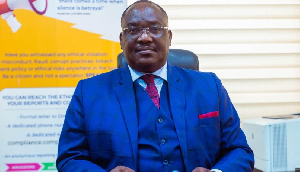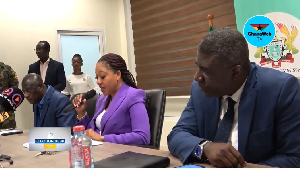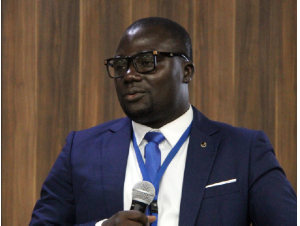The Bank of Ghana (BoG) has responded to allegations of financial impropriety and planned protests against it, asserting its solvency and commitment to the public interest.
This comes following claims made by the Member of Parliament for Bawku Central, Mahama Ayariga, who has alleged excessive spending on the part of the apex bank on a new residence for the Governor of the Bank of Ghana at a speculated cost of $40 million, among other financial missteps.
These claims have also prompted Mahama Ayariga, on behalf of Dr. Cassiel Ato Forson, the Minority Leader in Parliament, to notify the police about a planned public protest dubbed #OccupyBoG scheduled for July 30, 2024.
In response to the allegations, the Director of Communications for the Bank of Ghana, Bernard Otabil speaking with the media clarified several key points.
He emphasized that the Central Bank is not bankrupt and countered assertions of financial insolvency.
“Central banks all over the world are registering negative equity, and this does not mean they fold up and cease operations. Ours is the provision of the public good, therefore we place purpose over profit. This is the story of central banking.
“As I have explained in previous discussions, the Bank of Ghana is policy solvent and not bankrupt as it has been touted. In fact, the Annual Report and Financial Statements (2023) released a few months ago provide an elaborate explanation of the Bank’s policy solvency. In 2023, fighting inflation, that is reducing inflation from 54.1 percent at the end of December 2022 to 23.2 percent at the end of December 2023 came with a cost of more than GH¢8 billion, contributing to the loss in that year. In 2022, the Domestic Debt Exchange Programme was the bane of the financial position,” Otabil explained.
Otabil emphasized that the BoG's recently released financial statements for 2023 detailed the institution's policy solvency amidst operational challenges, particularly with regard to the government's Domestic Debt Exchange Programme (DDEP).
“If BoG had not suffered the hit, all the pension funds in the country would have been wiped out. BoG is the only institution that can absorb those losses and correct it over time,” he argued.
Addressing specific allegations on the said construction of the Governor’s residence, Otabil outrightly refuted the claims of a $40 million construction project, asserting that such claims were false and unfounded.
He explained that the BoG had indeed undertaken a construction project for a bank duty post, following due process under the Public Procurement Act.
Touching on the financial challenges faced by the BoG in the past few years, Bernard Otabil acknowledged the impact of initiatives like the Domestic Debt Exchange Programme (DDEP) and inflation-fighting measures, which had incurred substantial costs on its operations.
He underscored that these efforts were however crucial for stabilizing the economy and protecting pension funds from potential losses.
Otabil also highlighted the strategic planning processes within the Bank, where annual budgets are meticulously reviewed and approved by the Board after rigorous scrutiny. He emphasized the transparency in procurement processes, which adhere to PPA guidelines.
Responding to concerns about financial deficits, Otabil pointed out that international bodies like the International Monetary Fund (IMF) were aware of Ghana's economic strategy, including the need for gradual government recapitalization to mitigate the impact of past financial strategies.
“The IMF and all international bodies know we will run a deficit for a few years before the situation is corrected. The proposed government recapitalization only has to do with the direct impact of the DDEP, which was necessary to access the IMF programme.
"Government recapitalization will not be done in a single year. It will be done over a period of time in order not to negatively impact the fiscal space created. These are technical matters, and the Bank is ready to provide further education on it,” he explained.
The Director of Communications reaffirmed the Bank of Ghana's commitment to maintaining price stability and enhancing the living standards of Ghanaians.
He also expressed willingness to engage further with stakeholders through educational workshops in order to clarify technical matters and dispel any misconceptions.
MA/AE
Business News of Thursday, 11 July 2024
Source: www.ghanaweb.com

















